Cleaning aluminum pans effectively is essential to maintain their longevity and appearance. Aluminum cookware is popular due to its excellent heat conductivity and lightweight nature, but it requires proper care to avoid damage and discoloration.
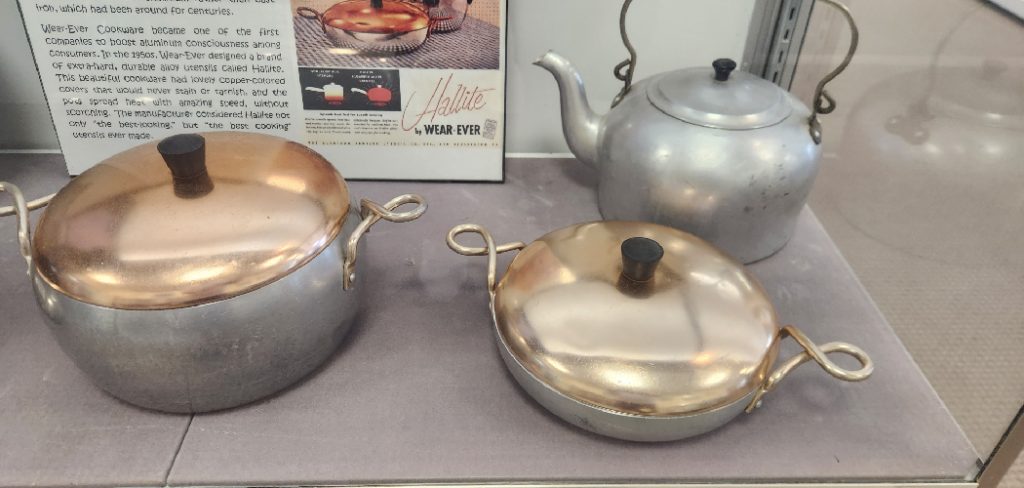
In this guide, you will learn simple and efficient methods to clean your aluminum pans, ensuring they stay in top condition for years to come. By following these steps on how to clean an aluminum pan, you can remove stains, restore shine, and prevent any build-up that could affect cooking performance.
Why Clean Aluminum Pans Regularly?
Aluminum pans can easily become stained and discolored due to the chemical reactions that occur during cooking. These stains not only affect the appearance of your pan but can also create hotspots, making it difficult to cook food evenly. Furthermore, if not cleaned properly, aluminum pans can develop a layer of residue that affects their cooking performance.
It is essential to clean your aluminum pans regularly to remove any food residue, stains, and build-up that can affect their appearance and performance. By practicing regular cleaning, you can prolong the lifespan of your pans and ensure they continue to function well.
Materials Needed
Before we dive into the cleaning methods for aluminum pans, let’s gather all the materials you will need:
Dish Soap or Detergent:
Choose a mild dish soap or detergent that is suitable for aluminum pans. Avoid harsh cleaners that can damage the surface of your pan.
Baking Soda:
Baking soda is an excellent natural cleaner and can be used to remove tough stains and build-up on aluminum pans.
White Vinegar:
Similar to baking soda, white vinegar also has cleaning properties and can help remove stains and discoloration from aluminum pans.
Lemon Juice:
Lemon juice contains citric acid, which makes it an effective natural cleaner for removing stains and restoring shine to aluminum pans.
Non-abrasive Scouring Pad or Sponge:
A non-abrasive scouring pad or sponge is best suited for cleaning aluminum pans as they are gentle on the surface and will not cause scratches.
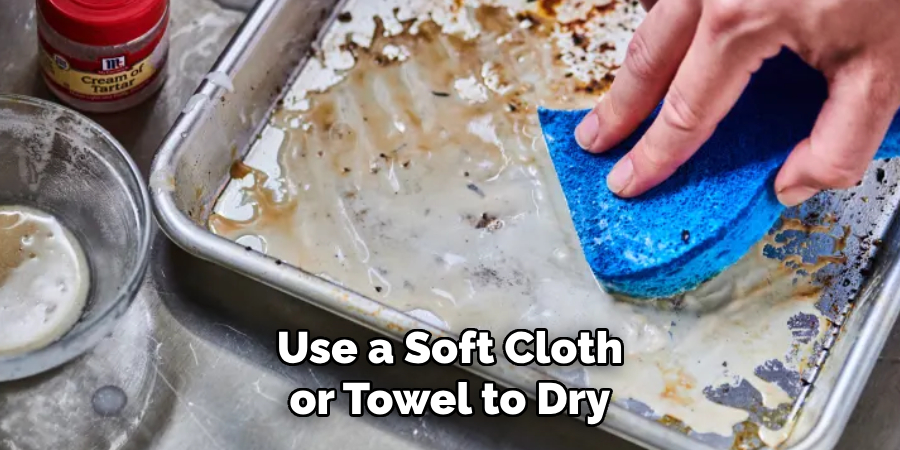
Soft Cloth or Towel:
After cleaning, use a soft cloth or towel to dry and polish your pan for a shiny finish.
Now that you have gathered all the necessary materials let’s move on to the methods for cleaning aluminum pans.
7 Simple Methods on How to Clean an Aluminum Pan
Method 1: Basic Cleaning with Dish Soap
This method is suitable for regular maintenance of your aluminum pans.
- Start by filling your sink with warm water and adding a few drops of dish soap or detergent.
- Place your aluminum pan in the sink and let it soak for 10-15 minutes.
- Use a non-abrasive scouring pad or sponge to gently scrub any stains or residue.
- Rinse the pan thoroughly with warm water and dry it with a soft cloth.
Method 2: Baking Soda Paste
Baking soda is an excellent natural cleaner for aluminum pans. This method is particularly useful for removing tough stains and build-up from your pan’s surface.
- In a small bowl, mix baking soda with enough water to create a paste.
- Apply the paste to the stained areas on your pan and let it sit for 10-15 minutes.
- Use a non-abrasive scouring pad or sponge to scrub the stained areas in circular motions.
- Rinse the pan thoroughly with warm water and dry it with a soft cloth.
Method 3: White Vinegar Soak
White vinegar is another natural cleaner that can help remove stains and discoloration from aluminum pans.
- Fill your sink with warm water and add half a cup of white vinegar.
- Place your pan in the sink and let it soak for 20-30 minutes.
- Use a non-abrasive scouring pad or sponge to gently scrub any remaining stains or residue.
- Rinse the pan thoroughly with warm water and dry it with a soft cloth.
Method 4: Lemon Juice
Lemon juice contains citric acid, making it an effective natural cleaner for removing stains and restoring shine to aluminum pans.
- Cut a lemon in half and sprinkle salt on one of the halves.
- Use the salted lemon to scrub the stained areas on your pan, adding more salt as needed.
- Rinse the pan thoroughly with warm water and dry it with a soft cloth.
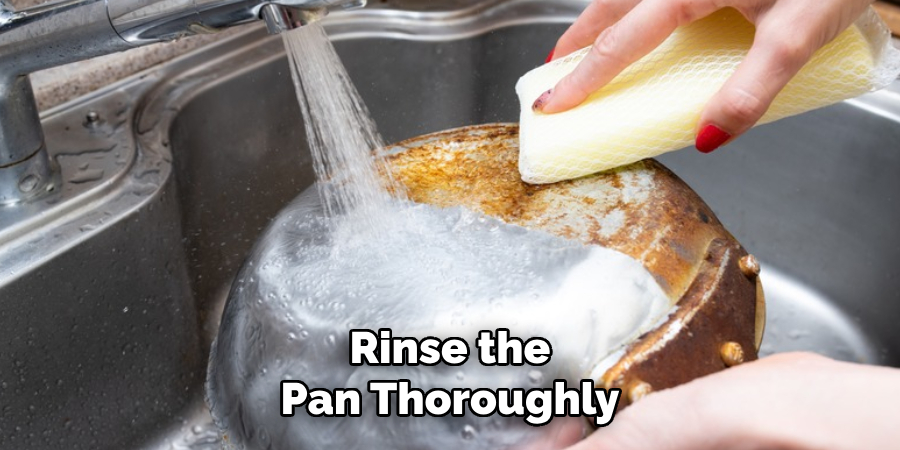
Method 5: Baking Soda and Lemon Juice Paste
By combining baking soda and lemon juice, you can create a powerful cleaning paste that is excellent for removing stains and restoring shine to your aluminum pans.
- In a small bowl, mix equal parts baking soda and lemon juice to make a paste.
- Apply the paste to the stained areas on your pan and let it sit for 10-15 minutes.
- Use a non-abrasive scouring pad or sponge to scrub the stained areas in circular motions.
- Rinse the pan thoroughly with warm water and dry it with a soft cloth.
Method 6: Boiling Water Soak
This method is suitable for removing stubborn stains from aluminum pans, but it should not be used on non-stick pans as it can damage the coating.
- Fill your pan with enough water to cover the stained area and bring it to a boil on the stove.
- Once boiling, reduce heat and let the pan simmer for 5-10 minutes.
- Turn off the heat and discard the water once it has cooled down.
- Use a non-abrasive scouring pad or sponge to gently scrub any remaining stains or residue.
- Rinse the pan thoroughly with warm water and dry it with a soft cloth.
Method 7: Aluminum Cleaner
If your aluminum pans have tough stains that cannot be removed with natural methods, you can use an aluminum cleaner specifically designed for this purpose. Follow the instructions on the cleaner’s packaging for best results.
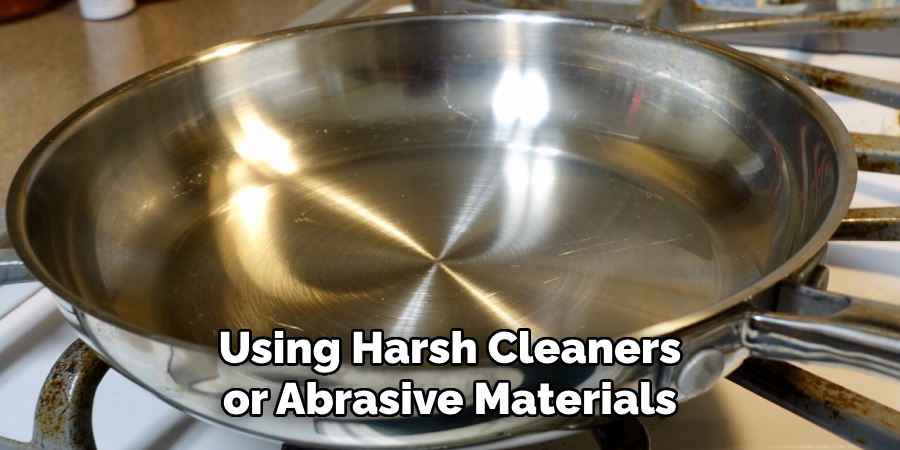
Following these simple methods on how to clean an aluminum pan will help keep your aluminum pans clean and in good condition. Remember to avoid using harsh cleaners or abrasive materials that can cause damage. With regular cleaning, your aluminum pans will continue to serve you well for many years. Happy cooking!
Do You Need to Use Professionals?
In most cases, cleaning aluminum pans does not require professional intervention. The methods mentioned above are straightforward, cost-effective, and suitable for household cleaning tasks. However, if your aluminum pans have extensive damage or discoloration that persists despite several cleaning attempts, you might consider consulting a professional.
Professionals can provide advanced cleaning techniques and may use specialized equipment or chemicals that are not readily available for home use. Additionally, they can help restore pans that play a crucial role in your kitchen, such as heirloom or specialty cookware, ensuring they maintain their performance and aesthetic appeal.
Tips for Maintaining Aluminum Pans
- Avoid using metal utensils on your aluminum pans as they can cause scratches and damage to the surface.
- Always hand wash your aluminum pans rather than putting them in the dishwasher, as harsh detergents and high temperatures can damage the surface.
- Do not use abrasive cleaners or steel wool on aluminum pans as they can scratch and ruin the pan’s coating.
- If your pan has burnt food residue, soak it in warm, soapy water for a few minutes before scrubbing to loosen the buildup.
- Always dry your aluminum pans thoroughly after cleaning to prevent any water spots from forming.
By following these simple methods and tips, you can keep your aluminum pans clean and in good condition for years to come. Regular maintenance, along with proper cleaning techniques, will ensure that your aluminum pans continue to perform well and last longer. So, make sure to give them some TLC every now and then to keep them looking their best.
Frequently Asked Questions
Q1: Can I Use Bleach to Clean My Aluminum Pans?
A: No, bleach is a harsh chemical that can cause corrosion and damage the surface of your aluminum pans. It is best to avoid using bleach and opt for natural cleaning methods.
Q2: Can I Put My Aluminum Pans in the Dishwasher?
A: It is not recommended to put aluminum pans in the dishwasher as the harsh detergents and high temperatures can cause damage. Hand washing with warm, soapy water is a safer option for maintaining your pans’ condition.
Q3: How Can I Remove Discoloration from My Aluminum Pans?
A: Discoloration on aluminum pans can often be removed by using natural cleaners such as lemon juice or white vinegar. If these methods do not work, you can try a specialized aluminum cleaner or consult a professional for advanced techniques.
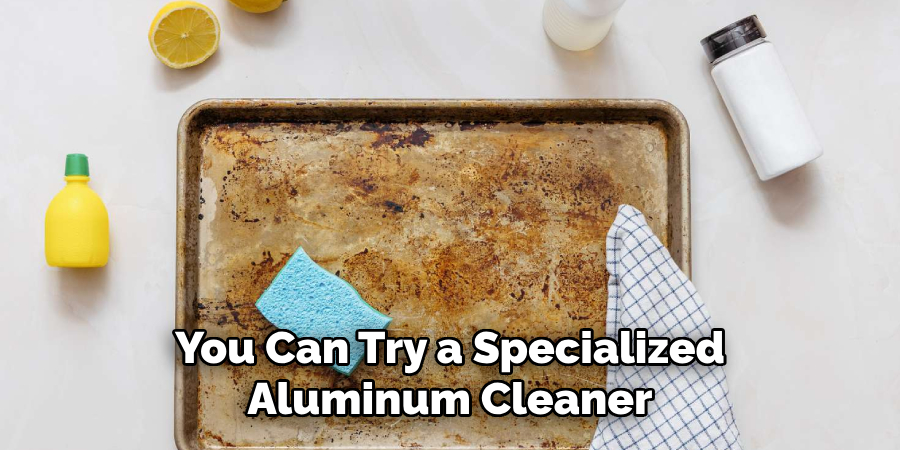
Conclusion
In summary, maintaining your aluminum pans in pristine condition is both achievable and worthwhile. By employing the simple methods outlined in this guide on how to clean an aluminum pan—ranging from basic cleaning with dish soap to using natural cleaners like baking soda, vinegar, and lemon juice—you can effectively tackle stains and restore shine without resorting to harsh chemicals.
Remember to follow the maintenance tips, such as avoiding abrasive materials and promptly drying the pans after washing, to extend their lifespan and maintain their performance. With regular care and attention, your aluminum pans will remain a staple in your kitchen, supporting countless delicious meals for years to come.
Edmund Sumlin is a skilled author for Metal Fixes, bringing 6 years of expertise in crafting a wide range of metal fixtures. With a strong background in metalwork, Edmund’s knowledge spans various types of fixtures, from decorative pieces to functional hardware, blending precision with creativity. His passion for metalworking and design has made him a trusted resource in the industry.
Professional Focus:
- Expert in Metal Fixtures : Edmund aesthetic specializes in creating durable and innovative metal fixtures, offering both appeal and functionality. His work reflects a deep understanding of metalworking techniques and materials.
- Sustainability Advocate : He is dedicated to using sustainable practices, ensuring that every fixture is crafted with eco-friendly methods while maintaining high-quality standards.
In his writing for Metal Fixes, Edmund provides valuable insights into the latest trends, techniques, and practical advice for those passionate about metal fixtures, whether they are professionals or DIY enthusiasts. His focus on combining artistry with engineering helps others discover the true potential of metal in design.


